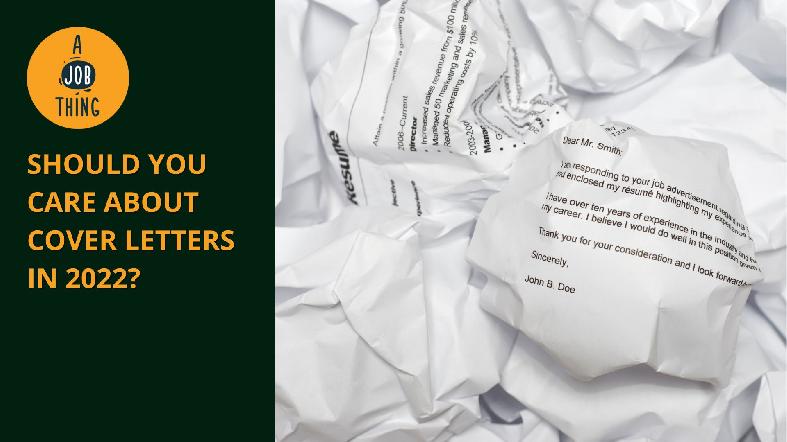
Should You Still Care About Cover Letters in 2022?
Create Job Description Using AI
Write appealing job descriptions for any job opening to attract the most qualifield and suitable candidates. FOR FREE.
try now
For many years, cover letters have been in demand. They can be an excellent tool for your HR team to screen applicants and determine which ones have the best backgrounds and cultural fit for your open roles.
According to 83% of HR experts, cover letters play a significant role in hiring decisions. Is it time to acknowledge that cover letters are not the best tool for evaluating candidate quality?
Are cover letters still relevant?
Candidates can stand out and leave a great impression on a recruiter by using cover letters.
They are well-liked for several reasons:
-
They aid recruiters in developing a full picture of a candidate.
-
If resumes are relatively equal, they serve as an effective filter.
-
It eliminates applicants who do not want to put forth the effort to apply for your position.
-
It may enable applicants with less than ideal experience to gain admission.
However, the job market is changing, so there is a chance that requesting cover letters from every applicant will backfire.
This is especially true if your business is recruiting for positions where candidates are aware of the competition for talent.
Three reasons to get rid of cover letters
1. Skills and experience > Cover letter.
The truth is that, unless you have a well-established internal HR or recruitment team, you may not always have the time to read through every cover letter you receive from applicants.
The influence of the cover letter is diminished because your applicant tracking system can automatically filter candidates based on the keywords or levels of experience that applicants mention in their resumes.
A cover letter will not make the difference between getting hired or not because most companies need to hire applicants with the specific skills they require.
2. They are subjective.
The fact that cover letters are subjective is a major problem. As a result, a strong cover letter for one recruiter might be viewed as weak by another.
Depending on who reads the cover letter, this can result in drastically different recruitment procedures and candidate selections. For instance, one team member might favour shortlisting candidates who use humour in their cover letters, leading to a candidate selection based on personal preference rather than applicant quality.
As you might unconsciously favour one particular style of the cover letter, which results in a specific type of applicant being shortlisted, even if they are not a better fit for the role in practice, it can also impact diversity numbers.
3. Top candidates are aware that their track record speaks for itself.
Early in their careers, people enjoy creating cover letters for each position they apply for. But as time goes on, writing cover letters loses its appeal for mid-career candidates with substantial experience. Additionally, most candidates dislike writing them.
The demand for these candidates already plays a role in some of that. They probably receive weekly LinkedIn messages from recruiters offering them a new position.
If they need a new role, they can quickly transition into one with a competitive salary and enticing benefits. There is a good chance that asking in-demand candidates for cover letters will discourage them from applying for your position.
4 things you can request from candidates that are not cover letters
1. Request for a video cover letter.
Video communication is more crucial than ever as more and more businesses transition to remote and hybrid work. Candidates can be asked to submit a brief video cover letter in which they can discuss their qualifications, experience, and motivations for applying.
This is especially beneficial for positions where applicants must be proficient verbal communicators. A person does not need to be a great writer to stand a chance of getting an interview, and it is more interactive than a cover letter.
Video cover letters can have the same issues as written ones because more outgoing candidates tend to come across better. To get around this, give them structure by asking participants to respond to predetermined questions in their video.
2. Ask for notable accomplishments using a structured application.
Including structured questions in your job application process is a good substitute for requiring candidates to write a cover letter that lacks a clear direction.
Examples of possible questions are:
-
What accomplishments in your most recent position had the biggest impact on the company?
-
Which issues have you most proudly resolved?
-
Which metrics have your efforts changed?
-
What led you to apply for this position?
In addition to allowing candidates to discuss their accomplishments and motivations for applying in their own words, more direct and structured questions can be an excellent way to learn more about a candidate's skills.
However, because it is shorter and more organised, candidates who dislike writing cover letters will not be turned off by it.
3. Fast-track candidates that are recommended to you
You might be able to do without cover letters entirely if you have an extensive network of recruiters or consistently get recommendations for qualified candidates.
Someone has a good reason to recommend a candidate to you. For instance, you should act quickly if a recruiter you know and trust contacts you to let you know they have a candidate who will be a great fit for your open position but already has other interviews scheduled.
It would be preferable to arrange a call or in-person meeting with the applicant rather than asking for a cover letter before they have a chance to receive offers from other companies.
An in-demand candidate will not need to write a cover letter for your role if they are already in talks with several other recruiters in a situation like this. Therefore, requesting a cover letter will only slow down the process and cause you to miss out.
4. Use a test or quiz to evaluate candidates.
Cover letters are a poor way to evaluate a candidate's qualifications or role fit. They assess a candidate's copywriting and marketing abilities more than anything else.
Consider asking candidates to complete a quick test that gauges their skills in place of a cover letter. This test could be as straightforward as a brief coding quiz or test or involve someone outlining their strategies for a fictitious business scenario.
As long as your test is relevant to the job someone will be performing, it is an excellent way for you to assess someone's competence quickly.
If you follow this path, keep your test brief and avoid making it something your business can use in practice. Candidates will be sceptical if they believe you will make money from their ideas.
Keep in mind that cover letters are not always bad.
Cover letters are not always ideal, but they can still be valuable for learning more about a candidate's application and context. For example, in some circumstances, a cover letter could mean the difference between a qualified applicant getting an interview or not.
In a perfect world, you would review your current hiring procedures to see if requesting a cover letter might be counterproductive.
Even if a candidate is a perfect fit, there is a chance that your cover letter requirements will discourage them from applying. The secret is trying different recruitment methods to see which shortlists candidates with the best qualifications.
It will not be an easy process because there will be different requirements for each role. Even though the positions you are hiring for differ in experience and skill sets, you will eventually notice the trends.
Cover letters can be a helpful tool when sorting through a long list of applicants. But, especially for mid-level and senior roles, they are rarely as crucial as skills and experience.
So before requesting a cover letter from every applicant, think about whether there are other, more effective ways to assess a candidate's suitability for the position and company.
In addition to being more beneficial to you as the recruiter than a cover letter, other techniques such as video cover letters or a brief practical test before an interview can efficiently narrow down your candidate shortlist.





